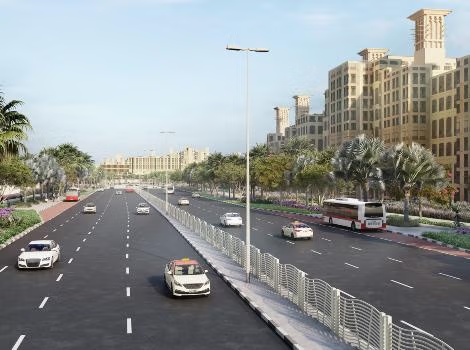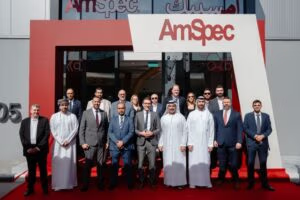The Roads and Transport Authority (RTA) has announced a major urban development initiative to upgrade Umm Suqeim Street. The project, which will extend from the intersection with Jumeirah Street to Al Khail Street, aims to enhance traffic flow and support the city’s ongoing population growth.
The announcement marks a continuation of the broader plan currently underway, which involves the development of Umm Suqeim Street from Al Khail Street to Emirates Road. Once completed, the corridor will enable uninterrupted travel over a 20 km stretch from the Jumeirah area to Al Qudra Street.
Beyond just increasing road capacity, the project incorporates creative and aesthetic improvements, including enhanced pedestrian pathways and a dedicated cycling lane to promote safer and more accessible transport options for all users. It also features the construction of integrated streets and urban boulevards designed to foster community engagement and provide vibrant public spaces. Connectivity will also be improved between residential communities surrounding Umm Suqeim Street and Mall of the Emirates Metro Station, enabling smoother access to public transport.
This initiative is part of a larger integrated plan by the RTA to upgrade key roads in the region, with future developments planned for Jumeirah, Al Wasl, and Al Safa streets.
A Key Strategic Corridor
His Excellency Mattar Al Tayer, Director-General and Chairman of the Board of Executive Directors of the RTA, stated: “The Umm Suqeim Street Improvement Project, from the intersection with Jumeirah Street to the intersection with Al Khail Street, is part of a comprehensive plan to develop the Umm Suqeim-Al Qudra Corridor, which extends from the intersection with Jumeirah Street to the intersection with Emirates Road, up to Al Qudra Street. The corridor serves several vital residential and development areas with a population exceeding two million people. The project contributes to enhancing the link between four strategic corridors in the Emirate of Dubai: Sheikh Zayed Road, Al Khail Road, Sheikh Mohammed bin Zayed Road, and Emirates Road. It will also increase the road’s capacity to 16,000 vehicles per hour in both directions, ensure smooth traffic flow, and reduce the journey time in the sector extending between Jumeirah and Al Khail Streets from 20 minutes to six minutes. It also serves several residential and development areas, most notably Jumeirah, Umm Suqeim, Al Manara, Al Sufouh, Umm Al Sheif, Al Barsha, and Al Quoz, with an estimated population of more than two million.”
Six Major Interchanges to Be Developed
The project involves upgrading six major intersections, including those with Jumeirah Street, Al Wasl Street, Sheikh Zayed Road, First Al Khail Street, Al Asayel Street, and Al Khail Street. The enhancements include the construction of four bridges and three tunnels, covering a total length of 4,100 meters.
Among the planned structures is a two-lane tunnel in each direction at the intersection with Jumeirah Street, accompanied by a surface-level signalized junction. Another tunnel with two lanes will connect traffic from Sheikh Zayed Road to Jumeirah Street via Al Wasl Street, ensuring direct surface travel toward Sheikh Zayed Road.
His Excellency added: “The project also includes the construction of two bridges at the intersection of Umm Suqeim Street with Sheikh Zayed Road to eliminate traffic overlap at the current intersection. A tunnel will be constructed at the intersection of Umm Suqeim Street with First Al Khail Street to serve the traffic coming from Al Barsha area towards Sheikh Zayed Road. Surface improvements will also be implemented at the intersection. The project also includes the addition of one lane on Umm Suqeim Street from its intersection with First Al Khail Street to Al Asayel Street, bringing the number of lanes to four in each direction. He explained that the development of the intersection of Umm Suqeim Street with Al Khail Street includes the construction and expansion of two flyovers: the first from Al Khail Street to Al Quoz Industrial Area, and the second serving the traffic from Umm Suqeim Street to Al Khail Street in the direction of Deira.”
Ongoing Phases and Future Plans
Currently, the RTA is executing a 4.6 km section of the Umm Suqeim Street project, running from Al Khail Street to Sheikh Mohammed bin Zayed Road. This phase includes a major upgrade near Kings School, with the construction of an 800-meter-long tunnel carrying four lanes in each direction, and a surface-level signalized junction. This phase has reached over 70% completion and is expected to open in Q3 2025.
Additionally, the RTA has commenced work on a complementary project to improve intersections along Al Qudra Road, extending from Sheikh Mohammed bin Zayed Road to Emirates Road. The works include several bridge constructions totaling 2,700 meters and an 11.6 km road expansion, expected to cut travel time from 9.4 minutes to 2.8 minutes.
Upgrading Strategic Dubai Corridor
— RTA (@rta_dubai) May 31, 2025
We are pleased to announce the upgrade of Umm Suqeim Street as part of an integrated urban project aiming to enhance infrastructure efficiency and improve traffic flow in one of the city's key areas.
This project marks a significant milestone… pic.twitter.com/Ymm9Wxy21X
Al Qudra Road Interchanges Development
A key aspect of this initiative involves constructing a 600-meter-long, four-lane bridge over Al Qudra Road at the intersection with the road connecting Arabian Ranches and Dubai Studio City. Another major interchange at Sheikh Zayed bin Hamdan Al Nahyan Street will feature a 700-meter-long bridge with seven lanes in both directions and auxiliary lanes for smoother traffic movement. Additional infrastructure includes a 500-meter bridge facilitating traffic from Al Qudra Road towards Jebel Ali, and a 900-meter bridge for traffic heading towards the city center and Dubai International Airport.
Service roads of three kilometers will also be constructed on either side of Sheikh Zayed bin Hamdan Al Nahyan Street to support nearby developments. Further improvements along Al Qudra Road from Emirates Road to the Developers Area roundabout will include increasing lane capacity, while a future street in the southern section of the Developers Area will enhance connectivity to Emirates Road.
This comprehensive infrastructure upgrade is poised to significantly improve traffic efficiency, support Dubai’s rapid urban development, and elevate the quality of life for residents and visitors alike.





